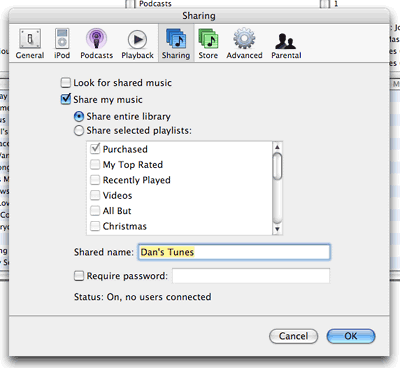This past week I finally discovered a use for the music sharing
feature in iTunes. The idea came to me while I was working on a
friend's computer.
His roommates happened to have the music sharing option turned on,
so their libraries were available on his computer. I didn't think much
about this until I realized that the other roommates were all using
Windows PCs.
This gave me the idea to share the music on my PC so I could listen
to it on my Mac.
It wasn't that I didn't know you could do this - I did know - it was
just that I'd never thought to use the feature in this way. I'd
imported a bunch of CDs on my PC while I was still using my blue G3. The CD-ROM drive in
that G3 frequently had trouble reading audio CDs.
Even though the G5 I'm currently using can import a CD in just a
couple of minutes, why use the hard drive space if I don't have to?
Not only does iTunes music sharing put another link in the bridge
between Mac and PC, it also gives others on your network an excellent
way to learn about some new music that they wouldn't have otherwise
discovered. This especially works well in a roommate situation.
 It
also raises the question: What will come next for music sharing?
It
also raises the question: What will come next for music sharing?
There are two possibilities that I'd like to see. Everyone seems to
be carrying an iPod these days, and it would be nice to be able to
listen to what a friend's listening to, perhaps while traveling
together. This could most likely be accomplished using Bluetooth.
giving your friend have access to your music library while someone
sitting across the plane from you wouldn't have access.
Sure, this could be an add-on to the existing iPod line, but putting
Bluetooth music sharing on the next generation iPod would provide an
incentive for people to buy new iPods.
An iTunes Stereo Component
It would also be nice if Apple offered some kind of stereo component
to complement the music sharing technology. While my new computer
speakers are certainly not bad, my stereo system sounds far better.
Components like this are already out there, but they are largely
expensive. For example, the Olive
Symphony retails for US$899. It has a built-in hard drive to store
imported CDs, a nice display so you can view what's playing, connects
to your wireless network to get CD track names, and lets you view the
music library that's on your computer, among other things. However, it
won't play iTunes Music Store tracks, which might be a problem for
those who have purchased downloads from Apple.
The other problem is that $899 is a bit much to ask consumers to
spend, and the Symphony offers a lot of features that many will never
use (such as being able to directly copy CDs to it's hard drive).
It would be interesting if Apple came out with a roughly $300 device
that allowed you to play the music that's on your computer through
802.11g while displaying the track name and artist. This goes way
beyond Apple's US$129 AirPort Express, which has
no screen and has iTunes control the process.
This device should also be able to dock with the iPod, playing music
stored on the iPod and charging it in the process.
This unit wouldn't need its own hard drive, and it would be
interesting if it offered the option to record from tapes and LPs
directly into MP3 or AAC format and store the songs on your iPod - or
maybe in your Mac's iTunes library. There should be no legal problems,
as you would have to have the tape or LP in order to rip the music.
(Sure, you might borrow it from a friend, but you can also borrow a CD
from a friend and import it into iTunes on your computer.)
A relatively inexpensive device like this should be able to connect
to a standard component stereo system as well as an all-in-one sound
system (bookshelf stereo, boom box, etc.) via the auxiliary
connections. And it would be nice if it was able to fit within a
standard stereo cabinet without requiring the top shelf or that it be
placed on the top of the cabinet.
The idea of being able to access your music from different computers
is great, and it's about time for Apple to extend the idea to iPods and
stereo systems.

 It
also raises the question: What will come next for music sharing?
It
also raises the question: What will come next for music sharing?
